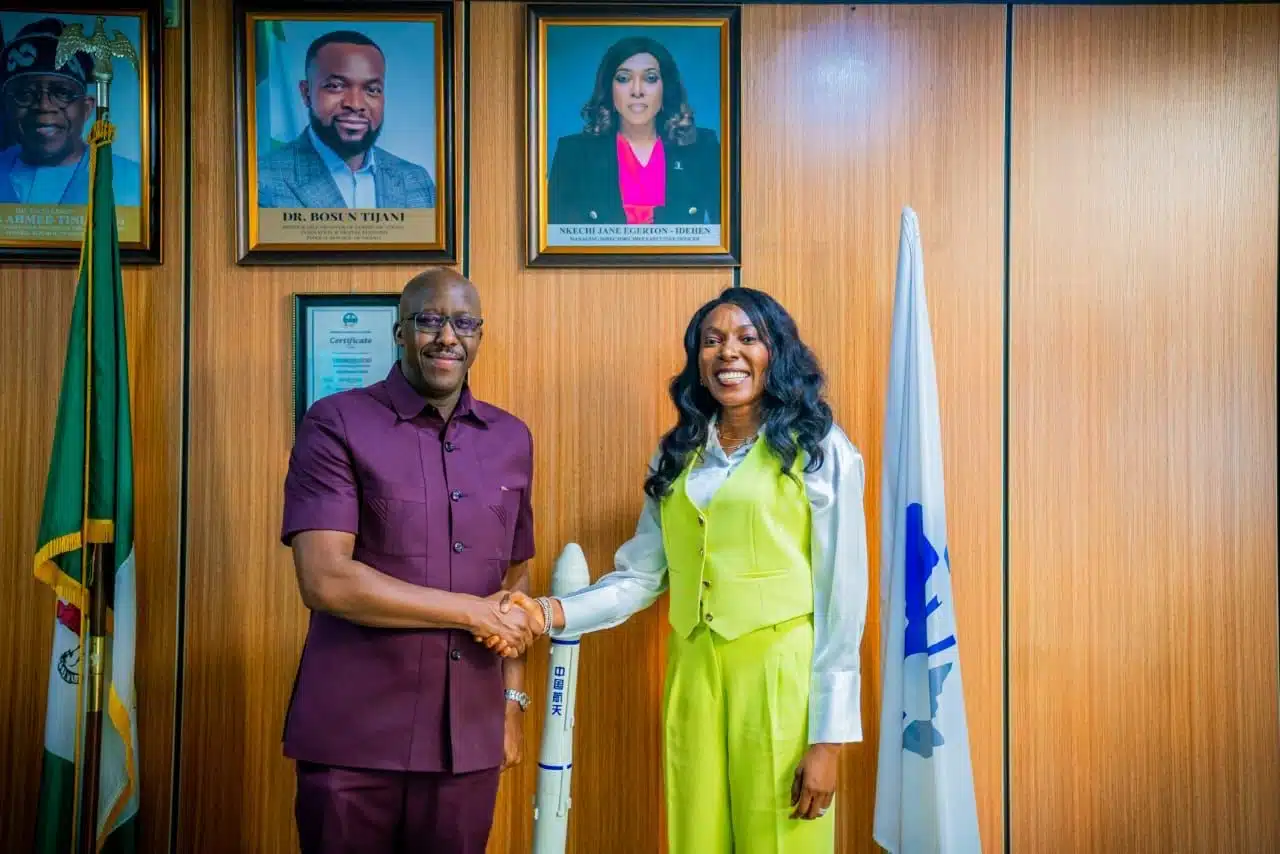Kenya is planning to source satellite services from Nigeria. The Nigeria Communications Satellite Limited (NIGCOMSAT) and the Kenyan Space Agency (KSA) have begun discussions on exploring a collaborative partnership for intra-African cooperation in space technology.
This is based on a five-day official visit by a delegation from the KSA led by its Director General, Brigadier (Rtd) Hilary Kipkosogey, to NIGCOMSAT’s control facility in Abuja, where the Managing Director of NIGCOMSAT, Jane Nkechi Egerton-Idehen, hosted them.
Here are some key questions and answers about this strategic collaboration.
What does the Nigeria-Kenya space collaboration entail?
This deal involves partnership across three major Nigerian space entities, which are the commercial satellite provision with NIGCOMSAT, capacity building and R&D with the National Space Research and Development Agency (NASRDA), and national security engagements with the Defence Space Agency (DSA).
For one, Kenya is looking to purchase satellite services from Nigeria’s state-owned satellite body, rather than sourcing them from non-African providers. This partnership will enable Kenya to leverage the services of Nigeria’s current satellite, NigComSat-1R.
This deal, however, is conditional on the coverage meeting Kenya’s technical requirements.
Beyond satellite service sharing, the partnership will see both countries developing joint programmes for knowledge and training in crucial areas, such as mission control, earth observation, remote sensing, and the application of artificial intelligence (AI) in space technology.
This partnership challenges the long-standing dependence on external powers for critical infrastructure, such as satellite services, demonstrating that African countries can provide solutions to problems and needs within the continent rather than sourcing them from outside.
Why Nigeria’s satellite?
Nigeria has one of the most advanced space programmes in Africa, which Kenya seeks to tap into. With over 25 years of space development, the West African country stands out as one of the few African countries to have successfully launched and operated six satellites across different mission types.

Victoria Fakiya – Senior Writer
Techpoint Digest
Stop struggling to find your tech career path
Discover in-demand tech skills and build a standout portfolio in this FREE 5-day email course
This move aims to enhance the local space economy and address critical issues, including national security, connectivity, and data sovereignty, across Kenya and Africa as a whole.
While Nigeria’s C-band (for large corporate networks) and L-band services (for mobile services) currently reach Kenya, the Ku-band (for broadcasting) and the Ka-band (for the Internet) do not. These coverage gaps are expected to be closed with the successful launch of Nigeria’s planned 2A and 2B satellites.
Rather than embarking on a costly independent satellite project, Kenya can leverage Nigeria’s existing capabilities and planned launches.
With its NIGCOMSAT-1R satellite already in operation and future satellites planned, Nigeria offers a ready-made solution for Kenya’s growing needs, potentially at a lower cost.
How does Nigeria benefit from this collaboration?
While broadband is NIGCOMSAT’s most profitable service, only 7% of its capacity is currently in use, leaving 93% idle. Securing Kenya as a commercial client of its resource will help utilise the idle capacity, generating revenue for the agency.
NIGCOMSAT plans to generate ₦8 billion within three years by expanding its broadband services across different parts of Nigeria.
The company hopes to generate at least ₦3 billion annually by diversifying beyond broadband broadcasting, satellite broadband, and digital infrastructure. NIGCOMSAT also plans to partner with mobile network operators to extend 2G, 3G, and 4G services to underserved rural communities.
Also, the commercial success of selling capacity to Kenya strengthens the business case for securing funding for the planned NigComSat-2A and 2B replacement satellites.
NIGCOMSAT had previously connected over 45 local government secretariats across eight states to its space satellite services in just two months under Project 774.
What does Kenya stand to gain?
The East African country stands to gain a regional supplier of satellite bandwidth, essential for mobile network backhaul and digital inclusion, particularly in areas unreachable by fibre optic cables.
For Kenya, this deal is significant in bridging the digital divide, expanding 4G/5G mobile networks in rural areas, and supporting emerging sectors such as agritech and e-government with reliable broadband.
By collaborating with NASRDA, Kenya can leverage Nigeria’s Earth Observation (EO) data and apply it to sectors like agriculture, forestry, disaster management, and infrastructure mapping. Sourcing from a fellow African nation is more financially viable and flexible than dealing with multinational space companies.
What are the next steps in finalising this collaboration?
The recent visit was more of an exploratory engagement; hence, the finalisation process requires additional technical and legal steps.
Kenya and NIGCOMSAT will conduct a detailed technical evaluation to confirm that the existing and planned Nigerian satellite capacity meets Kenya’s specific demands.
The committee constituted during the visit will convene to draft, negotiate, and finalise a formal Memorandum of Understanding (MoU) which will specify the terms of capacity leasing, pricing, training programmes, joint research projects, and long-term reservations, especially on the upcoming NigComSat-2A and 2B satellites.









